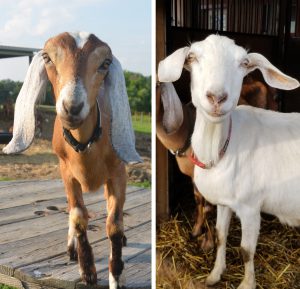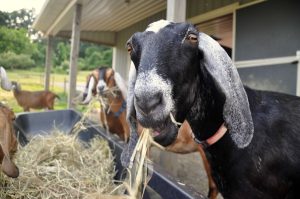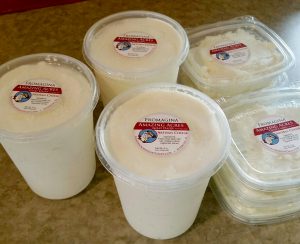FAQs
So Glad You Asked!
 What breed of goats do you raise?
What breed of goats do you raise?
The majority of our goats are Anglo-Nubian, commonly referred to as just “Nubian.” The breed originated in the nineteenth century from cross-breeding between native British goats and a mixed population of large lop-eared goats imported from India, the Middle East and North Africa. They are characterized by their long, floppy ears and a convex profile (or Roman nose). Nubians typically produce a little less milk than some of the Swiss dairy breeds, but the milk is higher in butterfat, providing more flavor and a great base for cheesemaking. We also have a few goats on our team that are Saanen/Nubian mixes, aka “Snubian.” The Saanen is a Swiss dairy breed that is all white with erect ears and is know for its high milk production.
What happens to all the kids born every spring?
Amazing Acres is a no-kill dairy. Every year, each of our milking does gives birth to one to three kids (and on a couple rare occasions four!). We typically keep a few doelings each year to join our milkers. The remaining kids stay with their mothers for at least 3 months. Over that time, they gradually transition to eating hay, pasture and a little bit of grain. After 3 months, they are available for sale to loving homes as pets, homestead milkers or companions to other goats, donkeys, sheep and horses. (Almost every “farm” animal enjoys the company of a couple of goats!)

What do your goats eat?
Goats are browsers and prefer eye-level vegetation like vines, long grasses, young trees and hardy shrubs (versus grazers like sheep, cattle and horses who prefer to eat at ground-level). This is why they are often used to clear rough, overgrown areas. It’s what they were made to eat! Our goats are free to roam their pastures to munch on the longer grasses, wildflowers and weeds. As often as time permits, we take the whole herd out walking to enjoy the wooded areas and meadows around our farm. We supplement with locally grown grass and legume hay, a small bit of grain to provide extra protein and nutrients when needed and a loose goat mineral mix that provides additional vitamins and minerals. They also enjoy most of our fruit and vegetable scraps and the occasional pretzel, raisin or animal cracker. Fresh water is available at all times. In the winter, they especially enjoy their waters warm with molasses added.
Do goats really eat anything?
Goats are curious and will nibble on many interesting or eye-catching items (buttons, zippers, ponytails), but they can actually be very picky eaters. They will sort through their hay to find the tastiest bites and toss the rest aside. They have their favorite pasture plants and will clear those first. If food or hay hits the ground, they are no longer interested in it. (Except animal crackers. Those are subject to the 5-second rule.) They DO NOT eat tin cans!
Do you give your goats receive antibiotics or growth hormones?
Our goats receive no drugs unless it is medically necessary. On the rare occasion that we have to use antibiotics for the health of a doe, that doe is milked separately and the milk is discarded.
Is your cheese vegetarian?
Yes. We use vegetarian rennet for all of our cheeses.
Do you use pasteurized milk?
Yes. All of our cheeses are made with pasteurized milk (Pennsylvania requires cheeses aged less than 60 days be made with pasteurized milk).
Do you sell milk?
No. We are a very small dairy and need every drop of our milk to make cheese.
Do you sell meat or goats for slaughter?
No.
Do your products contain gluten?
No. Cheese does not contain gluten. None of the ingredients we use to flavor our chèvres contain gluten.
 What is Fromagina?
What is Fromagina?
Fromagina is an undrained version of our chèvre. It is similar to and can be substituted for cream cheese or a dry ricotta.
Can I still eat your cheese after the “Best By” date?
There is nothing magical about the “best by” date on our cheeses. While our chevres are at their best when fresh, the “best by” date is an educated guess as to how long the cheese will remain delicious to eat. Differences in a customer’s handling and refrigeration of our cheese can alter the lifespan of our cheeses. By smelling, tasting, and looking at the appearance, you can use your best judgment to determine the cheese’s edibility, even past the “best by” date.
Can I freeze your cheese?
Frozen cheese?? Sounds crazy, but, yes, our chèvres and Fromagina freeze (and more importantly, unfreeze!) very well.
Do you make any hard cheeses? Feta?
We do not currently make hard cheeses or Feta, but we plan to in the future.
 Where can I buy your cheese?
Where can I buy your cheese?
We sell the majority of our cheese direct to the consumer at farmers markets. Additionally, you can find our chèvres and Fromagina at small shops that specialize in locally-produced foods. Find a list of markets and stores here.
Do you ship your cheese?
No. We are a micro-producer and are focused on providing our limited supplies to local customers.
Are you regulated/inspected?
Yes. The PA Department of Agriculture inspects our cheesemaking facilities every three months. Our milk and water are tested regularly by approved labs.
Can we visit the farm to purchase cheese or see the goats?
We do visits and cheese sales by appointment only. Our farm is our home, and like anyone else, we like to know who’s coming to visit ahead of time. There is no retail store on site.
Do you sell goats?
We sell our doelings (many purebred and registered) as pets, 4-H projects, and to homesteaders and other small dairies. We sell many of our wethers as companion animals and pets. We vet all potential homes to ensure, to the best of our knowledge, that our goats will have safe, loving homes. Email Lynne for information at cheese@amazingacresgoatdairy.com.
CALL US:
610-449-1987
Cheese@AmazingAcresGoatDairy.com
184 Grove Rd., Elverson, PA 19520

